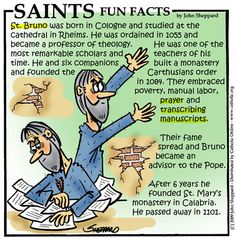
Saint Bruno (1030-1101)
Image Courtesy: Catholic Online
(EWTN) Born in Germany Cologne, Bruno is believed to have belonged to a prominent family, while little is known of his youthful days, one does know that he studied Theology in the present day French City of Rheims before returning to Germany where he was Ordained a Priest around 1055 and soon thereafter returning to Rheims, Fr. Bruno became head of the school and taught that he attended for nearly two decades, acquiring an excellent reputation.
Fr. Bruno became Chancellor of the local Diocese in 1075 his time as Chancellor coincided with an uproar in Rheims over the behavior of its new Bishop Manasses de Gournai — Suspended by the decision of a local council the Bishop appealed to Rome, while attacking and robbing the homes of his opponents. Fr. Bruno left the Diocese during this period even though he was considered a possible successor to Bishop Manasses, though Fr. Bruno was uninterested in leading the Church in Rheims.
Having resolved to renounce their worldly goods and positions and enter a religious life, Fr. Bruno and two of his friends. Inspired by a dream to seek the guidance from Bishop of Grenoble (later Canonized Saint Hugh of Grenoble Feast Day: 01 April) Fr. Bruno settled in the Chartreuse Mountains in 1084 joined by a small group of scholars looking to become Monks.
In 1088 one of Fr. Bruno’s former students was elected as Pope Blessed Urban II — Six years into his religious life, Fr. Bruno was called to leave his remote South Eastern France Monastery to assist Pope Urban II in his struggle against a rival papal claimant as well as the hostile Emperor Henry IV
Fr Bruno would serve as a close advisor to Pope Urban II during this critical period, around this time he would reject another opportunity to become a Bishop, this time in the Italian region of Calabria. While he received Pope Urban II blessing to return to his monastic life, Fr. Bruno was required to remain in Italy to help Pope Urban II periodically rather than returning to the Monastery that he loved in France.
Around 1090 Fr. Bruno befriended Roger Great Count of Sicily and Calabria who granted land to Fr. Bruno’s group of Monks which enabled the founding of the Monastery of St. Stephen in 1095 — The Monks were known then as they are to this day for their strict practice of self-discipline, poverty and prayer.
Fr. Bruno passed away on this date after making a notable profession of faith, which was preserved for posterity. In his final testimony, he gave particular emphasis to the doctrine of Christ’s Eucharistic presence, which had already begun to be questioned in parts of the Western Church:
“I believe in the Sacraments that the Church believes and holds in reverence and especially that what has been consecrated on the altar is the true Flesh and the true Blood of Our Lord Jesus Christ, which we receive for the forgiveness of our sins and the hope for eternal salvation.”
Veneration of St. Bruno was given final approval in 1514, he was never formally Canonized as the Carthusians were averse to all occasions of publicity however Pope Clement X extended his Feast to the entire Church in 1674
More here from Franciscan Media and here from The Carthusian Order
Tweet